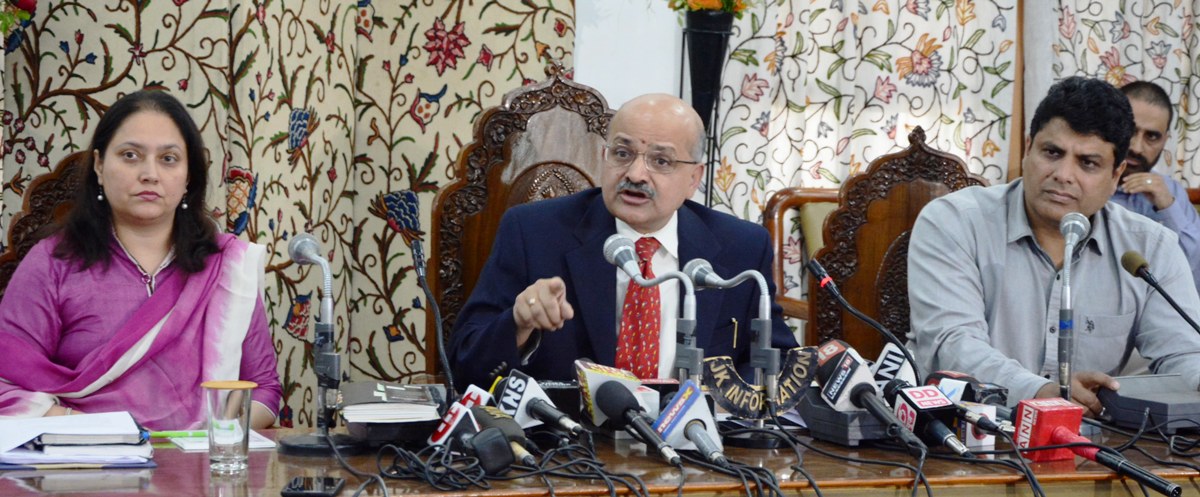by Khursheed Wani
The plausible argument presented by the state administration for holding a mammoth exercise of civic polls revolves around the quantum of funding that the state is bound to lose in absence of a gross roots level structure that these elections create. Chief Secretary BVR Subamanyam put the amount at Rs 4335 crore in last five years. Once in place, each panchayat structure would be entitled to spend Rs 50 lacs to one crore. Quite lucrative an offer and a bait for likes of Junaid Mattu, who resigned the post of chief spokesman of National Conference, to contest municipal polls from Srinagar and defy the party’s decision to stay away from these polls.
If the utilization of funds was such a consequential issue, the state should not have been in a financial crunch ever. The promises of funding and inordinate delay in releasing the amounts are not any secret. Look at the mode of funding and utilization of Prime Minister’s special package of Rs 80,000 crore.
The conduct of elections is essentially a resort to restore the pro-India political structure dismantled by the massive public unrest post-Burhan killing in July 2016. It is the consequence of this rebellion that the state is reeling under Governor’s rule and the 11th assembly elected in 2014 is in suspended animation. The by-election held in 2017, for Srinagar Parliamentary constituency did return Farooq Abdullah to the Parliament (with voter turnout of 7.2%) but the polling day is known for large-scale bloodletting rather than his ‘victory’. The horrible images of his namesake Farooq Dar, the army’s human shield, are the other gift to the memory landscape of Kashmiris on a polling day. In the past, they have been subjected to ‘nail parades’ when army would swoop on villagers to check if their fingers were ink-marked at the polling booths.

Elections in Kashmir have been invariably a highly incentivized military exercise since the onset of insurgency in 1990. This time it is not a different one. As many as 400 companies of central paramilitary forces are on way to the Valley to reinforce the existing security grid. Hundreds of hotel rooms have been taken over to accommodate the forces personnel and the wannabe contestants. The primary objective for the massive exercise is to erase the impression that holding elections is not impossible in Kashmir. The impression generated in April 2017 when by-poll for Anantnag parliamentary constituency was cancelled in the follow-up of bloodletting during Srinagar by-poll. Consequently, the constituency remained unrepresented after Mehbooba Mufti had quit it to take over as Chief Minister. The slit in the door is aimed at paving way for the conduct of Parliamentary polls in 2019 with simultaneous or subsequent conduct of assembly polls.
A significant aspect of the local polls is the decision of the unionist political parties to stay away from the exercise. With more than 330 militants active in the Valley and their overt threats to sabotage the electoral process, the decision of staying away is more driven by the ground situation rather than taking a moral stand on sensitive political issues connected with the future of the state. The groundswell is not in favour of pro-election politicians as they are unable to venture into public spaces. On the other hand, the turnout on funerals of militants and agitated people’s urge to save them when they are found trapped in hideouts, reflect the actual ground situation.
The elections would leave a far-reaching impact on main boycotting parties—PDP and the NC. They have been alternating power because of their participation in elections and their successes by default. This time Delhi is innovatively experimenting to go ahead with its plans irrespective of the overt support of its torch-bearers. This experimenting is likely to create commotion within the rank and file of these parties. The situation has resemblance with the conduct of 1969 panchayat polls when the Plebiscite Front was ruling the roost in Kashmir. The Front deviated from its pledge to plebiscite and passed a resolution in its working committee to take part in the local polls. Actually, a section of Front’s top leaders had begun hobnobbing to renege on the plebiscite plight. It spelled out in later years that the conduct of panchayat polls was a significant step to mellow down the Plebiscite Front and make Sheikh Muhammad Abdullah to fall in line. This time around, the situation appears to be somewhat different, but the outcome is most likely going to be similar.
The conduct of elections has been replete with violence in Kashmir since 1989. The biggest victims have been the workers and leaders of the contestants. There have been occasions when people were mysteriously killed to ensure poll boycott in specific pockets to help a particular party or candidate. There were mysterious blasts in election gatherings and none of these incidents were ever investigated. The occurrence of violence continues to be one of the most worrying factors for the people whenever the bugle of elections is blown. Ironically, the powers that be find the common people most expendable. Therefore, the ‘democratic exercises’ are thrust on them against their free will.














